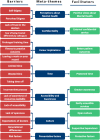What are the barriers and facilitators to seeking help for mental health in NHS doctors: a systematic review and qualitative study
- PMID: 36071392
- PMCID: PMC9450826
- DOI: 10.1186/s12888-022-04202-9
What are the barriers and facilitators to seeking help for mental health in NHS doctors: a systematic review and qualitative study
Abstract
Background: The mental health of healthcare professionals is reaching a breaking point, and the COVID-19 pandemic has exacerbated current mental health issues to unprecedented levels. Whilst some research has been carried out on the barriers that doctors face when seeking mental health help, there is little research into factors which may facilitate seeking help. We aimed to expand the research base on factors which act as barriers to seeking help, as well as gain insight into facilitators of help-seeking behaviour for mental health in NHS doctors.
Methods: We conducted a systematic literature review which identified the barriers and facilitators to seeking help for mental health in healthcare professionals. Following this, we conducted semi-structured interviews with 31 NHS doctors about their experiences with mental health services. Finally, through thematic analysis, key themes were synthesised from the data.
Results: Our systematic literature review uncovered barriers and facilitators from pre-existing literature, of which the barriers were: preventing actions, self-stigma, perceived stigma, costs of seeking treatment, lack of awareness and availability of support, negative career implications, confidentiality concerns and a lack of time to seek help. Only two facilitators were found in the pre-existing literature, a positive work environment and availability of support services. Our qualitative study uncovered additional barriers and facilitators, of which the identified barriers include: a negative workplace culture, lack of openness, expectations of doctors and generational differences. The facilitators include positive views about mental health, external confidential service, better patient outcomes, protected time, greater awareness and accessibility, open culture and supportive supervisors.
Conclusion: Our study began by identifying barriers and facilitators to seeking mental health help in healthcare workers, through our systematic literature review. We contributed to these findings by identifying themes in qualitative data.. Our findings are crucial to identify factors preventing NHS doctors from seeking help for their mental health so that more can be done on a national, trust-wide and personal level to overcome these barriers. Likewise, further research into facilitators is key to encourage doctors to reach out and seek help for their mental health.
Keywords: Barriers; Facilitators; Help-seeking behaviour; Mental health; NHS doctors; Qualitative study; Systematic review.
© 2022. The Author(s).
Conflict of interest statement
The authors declare that they have no competing interests.
Figures












References
-
- BMA . Caring for the mental health of the medical workforce British Medical Association. 2019.
-
- The Lancet. Physician burnout: a global crisis. Vol. 394, The Lancet. Lancet Publishing Group; 2019:93. - PubMed
-
- Gold JA. Covid-19: Adverse mental health outcomes for healthcare workers. The BMJ: BMJ Publishing Group; 2020. - PubMed
Publication types
MeSH terms
LinkOut - more resources
Full Text Sources
Medical

